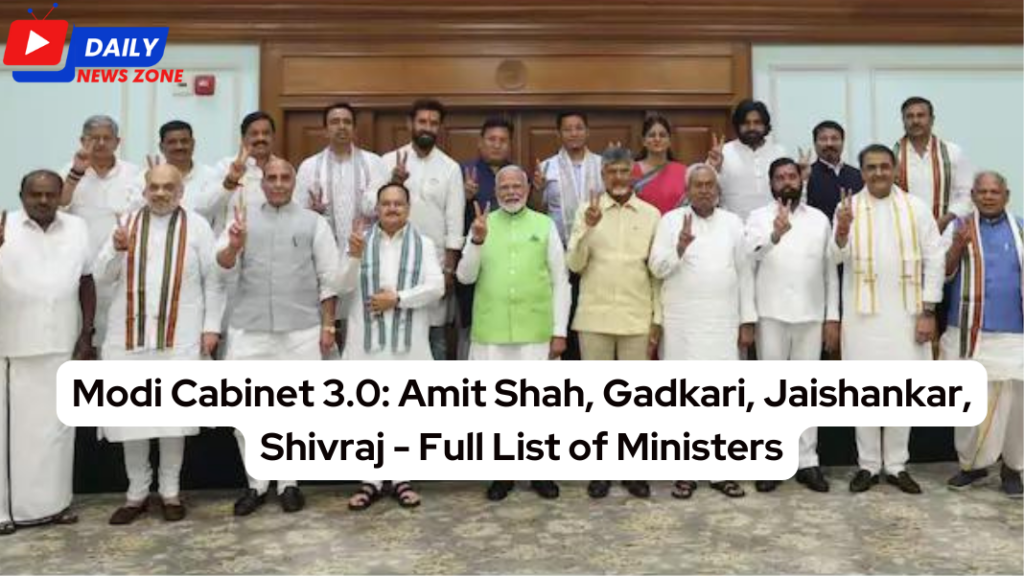Modi Cabinet 3.0: Amit Shah, Gadkari, Jaishankar, Shivraj – Full List of Ministers
6 min read
India’s political landscape witnessed a significant reshuffle with the introduction of Modi Cabinet 3.0, showcasing a blend of experienced leaders and fresh faces aimed at steering the nation towards growth and development. This comprehensive list includes critical figures such as Amit Shah, Nitin Gadkari, S. Jaishankar, and Shivraj Singh Chouhan, entrusted with vital portfolios. The reshuffle reflects the government’s intent to address pressing issues and implement strategic changes to enhance governance.
Key Highlights of Modi Cabinet 3.0
The Modi Cabinet 3.0 is strategically composed to handle critical areas like home affairs, finance, defense, and external affairs. Let’s delve into the detailed list of ministers and their respective portfolios.
Full List of Ministers and Portfolios
| Minister Name | Portfolio |
|---|---|
| Narendra Modi | Prime Minister; Ministry of Personnel, Public Grievances and Pensions; Department of Atomic Energy; Department of Space; All critical policy issues; and all other portfolios not allocated to any Minister |
| Rajnath Singh | Minister of Defence |
| Amit Shah | Minister of Home Affairs; Minister of Cooperation |
| Nitin Gadkari | Minister of Road Transport and Highways |
| Nirmala Sitharaman | Minister of Finance; Minister of Corporate Affairs |
| Narendra Singh Tomar | Minister of Agriculture and Farmers Welfare |
| Dr. S. Jaishankar | Minister of External Affairs |
| Arjun Munda | Minister of Tribal Affairs |
| Smriti Irani | Minister of Women and Child Development; Minister of Minority Affairs |
| Piyush Goyal | Minister of Commerce and Industry; Minister of Consumer Affairs, Food and Public Distribution; Minister of Textiles |
| Dharmendra Pradhan | Minister of Education; Minister of Skill Development and Entrepreneurship |
| Pralhad Joshi | Minister of Parliamentary Affairs; Minister of Coal; Minister of Mines |
| Sarbananda Sonowal | Minister of Ports, Shipping and Waterways; Minister of AYUSH |
| Mukhtar Abbas Naqvi | Minister of Minority Affairs |
| Dr. Mahendra Nath Pandey | Minister of Heavy Industries |
| Giriraj Singh | Minister of Rural Development; Minister of Panchayati Raj |
| Jyotiraditya Scindia | Minister of Civil Aviation |
| Ramchandra Prasad Singh | Minister of Steel |
| Ashwini Vaishnaw | Minister of Railways; Minister of Communications; Minister of Electronics and Information Technology |
| Pashupati Kumar Paras | Minister of Food Processing Industries |
| Gajendra Singh Shekhawat | Minister of Jal Shakti |
| Kiren Rijiju | Minister of Law and Justice |
| Raj Kumar Singh | Minister of Power; Minister of New and Renewable Energy |
| Hardeep Singh Puri | Minister of Petroleum and Natural Gas; Minister of Housing and Urban Affairs |
| Mansukh Mandaviya | Minister of Health and Family Welfare; Minister of Chemicals and Fertilizers |
| Bhupender Yadav | Minister of Environment, Forest and Climate Change; Minister of Labour and Employment |
| Parshottam Rupala | Minister of Fisheries, Animal Husbandry and Dairying |
| G. Kishan Reddy | Minister of Culture; Minister of Tourism; Minister of Development of North Eastern Region |
| Anurag Singh Thakur | Minister of Information and Broadcasting; Minister of Youth Affairs and Sports |
Analysis of Key Ministers
Amit Shah: As the Minister of Home Affairs and Minister of Cooperation, Amit Shah plays a pivotal role in maintaining internal security and promoting cooperative movements across the country. His strategic decisions have been instrumental in addressing national security issues and fostering unity.
Nitin Gadkari: As Minister of Road Transport and Highways, Nitin Gadkari has been a driving force behind India’s infrastructure development. His focus on expanding the national highway network and implementing innovative road transport solutions has significantly improved connectivity.
Dr. S. Jaishankar: Serving as the Minister of External Affairs, Dr. S. Jaishankar is responsible for shaping India’s foreign policy and strengthening international relations. His diplomatic expertise is crucial in navigating global challenges and enhancing India’s presence on the world stage.
Nirmala Sitharaman: As the Minister of Finance and Corporate Affairs, Nirmala Sitharaman is at the forefront of managing India’s economic policies and corporate regulations. Her efforts are directed towards stabilizing the economy and promoting sustainable growth.
Shivraj Singh Chouhan: Although not listed in the central cabinet, Shivraj Singh Chouhan’s influence remains significant as the Chief Minister of Madhya Pradesh. His leadership in the state contributes to the Modi government’s overall development agenda.
New Faces in the Cabinet
Modi Cabinet 3.0 also features new faces with fresh perspectives and ideas. This infusion of new talent is expected to drive innovation and reform across various sectors. The new ministers, such as Ashwini Vaishnaw, Bhupender Yadav, and Anurag Singh Thakur, bring diverse expertise and are anticipated to play crucial roles in modernizing their respective sectors and enhancing their efficiency.
- Ashwini Vaishnaw: With a diverse background in engineering and management, Ashwini Vaishnaw’s leadership in Railways, Communications, Electronics, and Information Technology is expected to bring a fresh perspective and drive to these sectors. This focus on modernization and efficiency will likely inspire hope about the potential for innovation in these areas.
- Bhupender Yadav: As the Minister of Environment, Forest and Climate Change, and Labour and Employment, Bhupender Yadav’s dual role underscores the government’s unwavering commitment to sustainable development and labor reforms. This emphasis on long-term sustainability and social welfare will likely inspire optimism about the future.
- Anurag Singh Thakur: Tasked with Information and Broadcasting, Youth Affairs, and Sports, Anurag Thakur’s dynamic approach aims to revitalize India’s media landscape and promote youth engagement in sports.
Key Initiatives and Policy Directions
The Modi Cabinet 3.0 reshuffle reflects a strategic alignment of portfolios to meet the government’s development goals. Key initiatives and policy directions include infrastructure development, agricultural reforms, economic stability, healthcare enhancement, diplomatic engagements, and education and skills development. These initiatives aim to address pressing issues and foster growth and development across various sectors.
- Infrastructure Development: With Nitin Gadkari continuing as the Minister of Road Transport and Highways, there is a strong emphasis on expanding the national highway network and improving road connectivity. This initiative aims to enhance trade, reduce travel time, and boost regional economic activities.
- Agricultural Reforms: Under Shivraj Singh Chouhan’s leadership, the Ministry of Agriculture and Farmers Welfare is expected to implement policies aimed at increasing agricultural productivity, ensuring fair prices for farmers, and promoting sustainable farming practices. Initiatives such as crop insurance schemes and improved market access will be prioritized.
- Economic Stability: Nirmala Sitharaman’s role as the Finance Minister is crucial in steering the economy towards recovery and growth. She will focus on implementing fiscal policies that attract investment, promote industrial development, and stabilize the financial sector. Measures to support small and medium enterprises (SMEs) and stimulate consumer spending are also anticipated.
- Healthcare Enhancement: Mansukh Mandaviya’s leadership in the Ministry of Health and Family Welfare is expected to address the country’s pressing healthcare challenges. Key priorities will be strengthening the healthcare infrastructure, ensuring vaccine availability, and improving public health services.
- Diplomatic Engagements: S. Jaishankar’s tenure as the External Affairs Minister has seen significant diplomatic engagements and strategic alliances. His continued focus will be enhancing India’s global footprint, negotiating trade agreements, and addressing international challenges through diplomatic channels.
- Education and Skills Development: Dharmendra Pradhan’s role in the Ministry of Education and Skill Development and Entrepreneurship is to overhaul the education system and promote skill development. Initiatives will be emphasized to modernize educational curricula, expand vocational training programs, and support startups.
Impact on Governance and Public Perception
The Modi Cabinet 3.0 aims to create a more efficient and responsive government. By aligning experienced leaders with key portfolios, the administration seeks to address critical issues such as economic recovery, healthcare, education, and infrastructure development. This reshuffle reflects the government’s commitment to inclusive growth and social welfare.
Public perception of the new cabinet is generally positive, with expectations of accelerated progress in various sectors. The emphasis on experienced ministers handling crucial portfolios is seen as a strategic move to ensure effective governance and policy implementation.
Challenges and Opportunities
While the reshuffle brings new opportunities, it also presents several challenges. Key challenges include managing the economic recovery post-pandemic, addressing healthcare disparities, ensuring agricultural sustainability, and navigating complex international relations. However, these challenges allow the government to implement transformative policies and drive sustainable development.
Conclusion
The Modi Cabinet 3.0 represents a well-calibrated effort to enhance governance and address India’s multifaceted challenges. With experienced leaders at the helm of critical ministries, the government is poised to implement strategic policies to foster growth, ensure social welfare, and position India as a global player. The coming years will be crucial in determining the success of these initiatives and the overall impact on the country’s development trajectory.
By focusing on critical areas such as infrastructure, healthcare, education, and economic stability, the Modi Cabinet 3.0 aims to create a more robust and resilient India. The strategic alignment of portfolios and the emphasis on experienced leadership underscore the government’s commitment to achieving its development goals and addressing the needs of its citizens.






